Machine Learning for Real-time Order Promising and Fulfillment Scheduling
In the world of industrial manufacturing, meeting customer demands while optimizing production processes is a constant challenge. Purchasing Managers in high-tech manufacturing facilities are often tasked with ensuring that materials and resources are available when needed, while also striving for efficient use of assets. The integration of advanced technologies like Machine Learning with Enterprise Resource Planning (ERP), Supply Chain Management (SCM), and Manufacturing Execution Systems (MES) can be a game-changer in achieving these goals.
In this blog, we will explore the benefits and possibilities of using Machine Learning, particularly with PlanetTogether, to enhance real-time order promising and fulfillment scheduling in high-tech manufacturing, while integrating it with leading ERP systems like SAP, Oracle, Microsoft, Kinaxis, Aveva, and others.
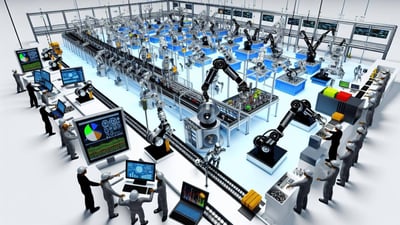
The Complex World of High-tech Manufacturing
High-tech manufacturing is characterized by its dynamic and rapidly changing environment. Products are often complex, with numerous components and dependencies. Customer demands can fluctuate dramatically, and disruptions in the supply chain are not uncommon. In such an environment, traditional scheduling methods may fall short in delivering efficient and reliable results.
Purchasing Managers are under constant pressure to make accurate promises to customers regarding order delivery times. They must also optimize production schedules to minimize downtime, reduce costs, and maximize resource utilization. Achieving these objectives in real-time is a formidable task, but it's precisely where Machine Learning and advanced planning tools can make a significant difference.
Machine Learning in Real-time Scheduling
Machine Learning (ML) is a subset of artificial intelligence that focuses on the development of algorithms and models that enable computers to learn and make predictions or decisions without explicit programming. In the context of high-tech manufacturing, ML can be employed to analyze historical data, identify patterns, and make real-time predictions about production processes, inventory levels, and order fulfillment.
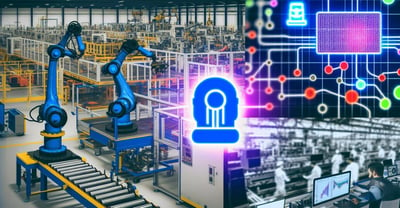
Benefits of Machine Learning in Manufacturing
Improved Forecasting: ML algorithms can analyze historical sales data, seasonality, and external factors (e.g., market trends, economic indicators) to provide more accurate demand forecasts. This allows Purchasing Managers to plan their procurement and production schedules more effectively.
Dynamic Scheduling: ML algorithms can continuously monitor the production environment, adapting schedules and resource allocations in real-time based on changing conditions. This flexibility helps in meeting unexpected demand surges or handling disruptions in the supply chain.
Optimized Resource Allocation: Machine Learning can optimize the allocation of resources such as labor, machines, and raw materials, ensuring efficient use and reducing production costs.
Reduced Lead Times: By constantly analyzing data and making real-time adjustments, ML-driven scheduling can significantly reduce lead times, which is crucial in high-tech manufacturing where time-to-market is critical.
Enhanced Customer Satisfaction: Accurate order promising and on-time delivery, made possible through ML, can lead to improved customer satisfaction and loyalty.
![]()
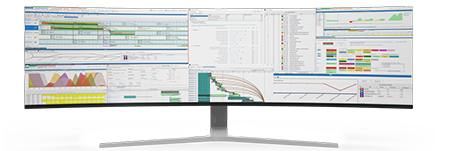
PlanetTogether: A Powerful Tool for Manufacturing Scheduling
PlanetTogether is a leading advanced planning and scheduling (APS) software solution. It combines the power of AI and optimization algorithms to provide real-time visibility into production processes and enable agile decision-making. When integrated with Machine Learning, PlanetTogether becomes an even more potent tool for Purchasing Managers in high-tech manufacturing.
Key Features of PlanetTogether
Multi-objective Optimization: PlanetTogether can simultaneously optimize multiple production objectives, such as minimizing lead times, maximizing resource utilization, and reducing production costs.
Scenario Analysis: It allows users to create and compare various production scenarios, helping Purchasing Managers make informed decisions about order promising and scheduling.
Capacity Planning: PlanetTogether helps in capacity planning by providing insights into available resources and their utilization. This is crucial for making accurate promises to customers.
Real-time Updates: The software can receive real-time data from the production floor, ensuring that schedules remain up-to-date and aligned with the actual manufacturing environment.
Integration Capabilities: PlanetTogether offers robust integration capabilities with various ERP, SCM, and MES systems, including SAP, Oracle, Microsoft, Kinaxis, Aveva, and others.
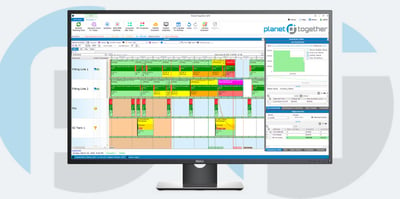
Integration with ERP, SCM, and MES Systems
For Purchasing Managers, the seamless integration of advanced planning tools like PlanetTogether with existing ERP, SCM, and MES systems is crucial. These systems are the backbone of high-tech manufacturing operations, managing everything from procurement and inventory management to quality control and order fulfillment. Integrating them with AI and ML-driven scheduling solutions unlocks even more potential for efficiency and agility.
Benefits of Integration
Data Visibility: Integration ensures that data flows seamlessly between systems, providing a holistic view of operations. This visibility is essential for accurate decision-making.
Real-time Updates: Information from the production floor is transmitted to the scheduling system in real-time, allowing for immediate adjustments and minimizing delays.
Streamlined Processes: Integrated systems enable automated workflows, reducing manual data entry and the risk of errors.
Improved Accuracy: With up-to-date data from ERP, SCM, and MES systems, Machine Learning algorithms can make more accurate predictions and scheduling decisions.
Efficient Resource Allocation: Integrating with MES systems helps in monitoring machine performance and maintenance needs, ensuring optimal resource allocation.
Integration with Leading ERP Systems
SAP
Integrating PlanetTogether with SAP brings together the power of SAP's robust ERP capabilities and PlanetTogether's advanced scheduling algorithms. SAP's real-time data integration and PlanetTogether's dynamic scheduling create a seamless flow of information from order placement to fulfillment.
Oracle
Oracle's ERP system provides a comprehensive platform for managing manufacturing operations. Integrating with PlanetTogether enhances Oracle's capabilities by introducing predictive and adaptive scheduling that can respond to changing production demands in real-time.
Microsoft Dynamics
Microsoft Dynamics users can benefit from the flexibility and agility of PlanetTogether's scheduling capabilities. The integration enables a more agile approach to production planning and resource allocation.
Integration with SCM and MES Systems
Kinaxis
Kinaxis RapidResponse is a leading SCM and S&OP solution. Integrating it with PlanetTogether ensures that demand and supply are always in sync, allowing for more accurate order promising and fulfillment scheduling.
Aveva
Aveva MES is designed for real-time manufacturing execution and performance optimization. Integration with PlanetTogether facilitates a closed-loop control system where scheduling decisions can directly impact the execution on the shop floor.
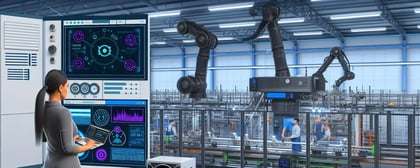
Implementing Machine Learning and PlanetTogether Integration
The implementation of Machine Learning and PlanetTogether integration can be a significant undertaking, but the benefits are well worth the effort. Here are the key steps involved:
Assess Current Systems
Start by conducting a thorough assessment of your existing ERP, SCM, and MES systems. Understand their strengths and weaknesses and identify areas where integration can bring the most value.
Define Objectives
Clearly define your objectives for integrating Machine Learning and PlanetTogether. Are you looking to reduce lead times, optimize resource utilization, or improve order promising accuracy? Knowing your goals will guide the integration process.
Data Preparation
Machine Learning relies on data. Ensure that your data is clean, structured, and readily accessible. Historical data on orders, production schedules, and inventory levels will be crucial for training ML models.
Select Machine Learning Algorithms
Work with data scientists or ML experts to select the right algorithms for your specific needs. These algorithms will analyze historical data and make real-time predictions for scheduling.
Integration Planning
Plan the integration between PlanetTogether and your ERP, SCM, and MES systems. Consult with experts in both solutions to ensure a seamless flow of data and real-time updates.
Pilot Implementation
Before rolling out the integration across your entire manufacturing facility, conduct a pilot implementation. This allows you to identify and address any issues or fine-tune the system for optimal performance.
Training and Adoption
Train your team on the new integrated system and ensure they understand how to leverage Machine Learning and PlanetTogether for scheduling and order promising.
Continuous Improvement
Machine Learning models can be continuously improved with more data and feedback. Regularly review and refine your ML algorithms for better results.
In the competitive world of high-tech manufacturing, meeting customer demands while optimizing production processes is essential for success. Purchasing Managers play a crucial role in this endeavor, and they can benefit significantly from the integration of Machine Learning with advanced planning tools like PlanetTogether.
By harnessing the power of Machine Learning, you can make more accurate order promises, reduce lead times, optimize resource utilization, and ultimately enhance customer satisfaction. When integrated seamlessly with ERP, SCM, and MES systems such as SAP, Oracle, Microsoft, Kinaxis, Aveva, and others, these benefits are magnified.
The path to integrating Machine Learning and PlanetTogether may involve challenges, but the rewards in terms of efficiency, cost savings, and customer loyalty are well worth the investment. As high-tech manufacturing continues to evolve, those who embrace these technologies will have a competitive edge and be better positioned to thrive in the fast-paced world of industrial manufacturing.
Are you ready to take your manufacturing operations to the next level? Contact us today to learn more about how PlanetTogether can help you achieve your goals and drive success in your industry.
Topics: Industrial Manufacturing, PlanetTogether Software, Real-Time Updates, Integrating PlanetTogether, Improved Accuracy, Reduce Lead Times, Enhance Customer Satisfaction, Optimize Resource Utilization, Machine Learning (ML), Streamlined Processes, Efficient Resource Allocation and Scheduling, Data Visibility and Transparency, Accurate Order Promises, Order Promising and Fulfillment




















LEAVE A COMMENT